Pope Francis told Univisión journalists in an exclusive interview aired on Monday that he had “a human relationship” with brutal dictator Raúl Castro and was pleased with Obama-era concessions to the communists — concessions that resulted in increased repression on the island.
Pope Francis’s comments about Cuba – emphasizing that the island is a “symbol” and encouraging dialogue with the violent, atheist regime – are particularly shocking in light of the fact that Univisión aired them on the anniversary of the largest anti-communist protests in recent memory. On July 11, 2021, an estimated 187,000 people in nearly every municipality on the island took to the streets to peacefully demand an end to the repressive 63-year-old communist government, prompting the Castro regime to call on communists to violently attack civilians and launch a wave of terror featuring door-to-door raids and mass violent arrests of suspected child protesters.
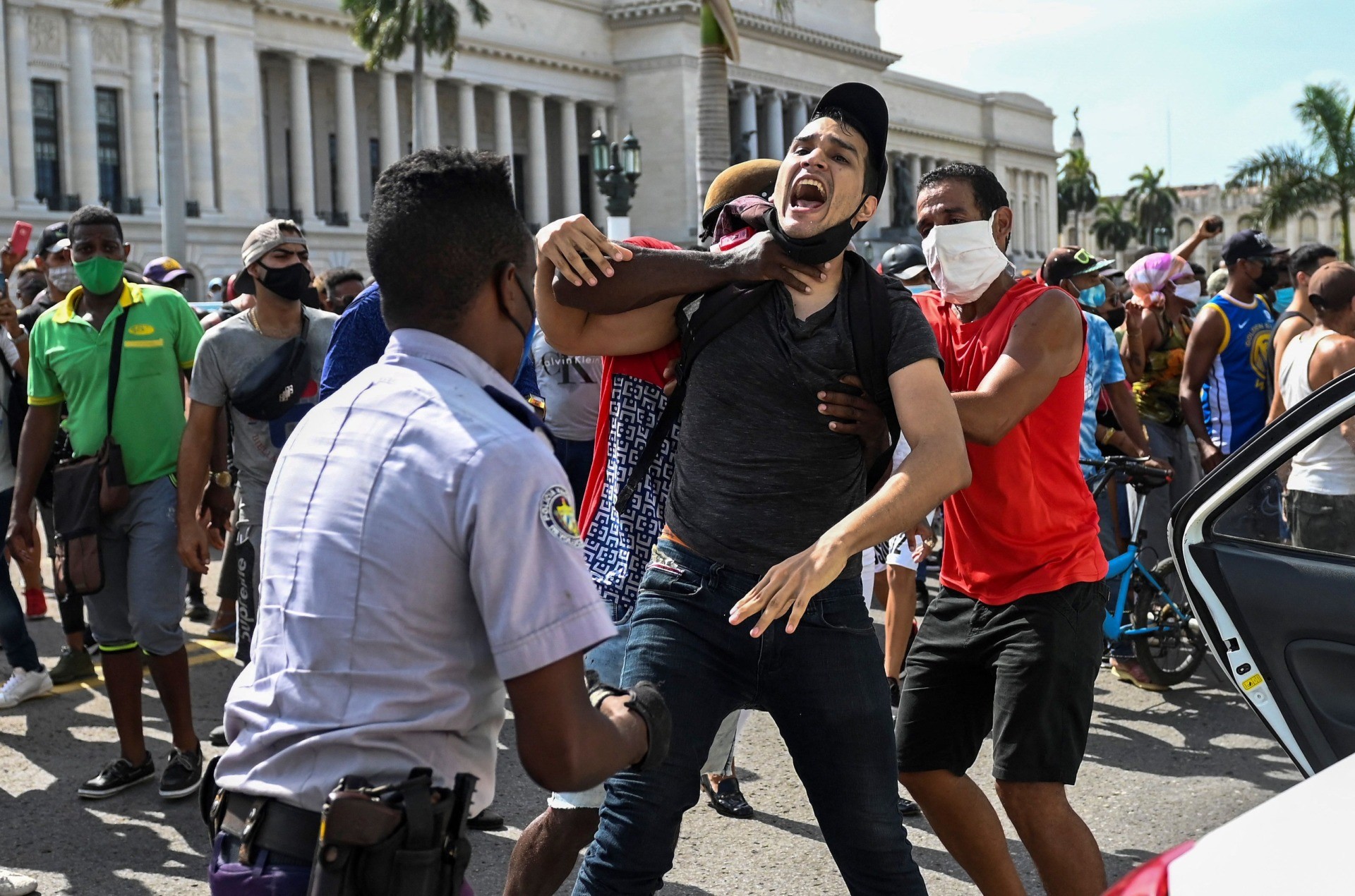
A man is arrested during a demonstration against the government of Cuban President Miguel Díaz-Canel in Havana, on July 11, 2021. (YAMIL LAGE/AFP via Getty Images)
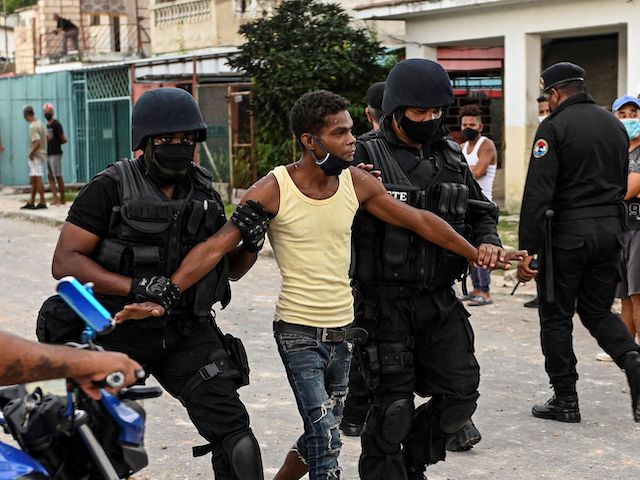
A man is arrested during a demonstration against the government of President Miguel Díaz-Canel in Arroyo Naranjo Municipality, Havana on July 12, 2021.Thousands of Cubans participated in Sunday’s demonstrations, chanting “Down with the dictatorship,” as President Miguel Díaz-Canel urged supporters to confront the protesters. (YAMIL LAGE/AFP via Getty Images)
Pope Francis made the comments in an interview with Univisión journalists María Antonieta Collins y Valentina Alazraki streamed on the network’s ViX platform – an interview that Collins told anchor Jorge Ramos took years to secure.
“I love the Cuban people very much. I had good human relations with Cuban people and I will also confess: with Raúl Castro I have a human relationship,” Pope Francis told the reporters. “I was happy when the small agreement with the United States that President Obama wanted in his moment occurred, and Raúl Castro accepted it and it was a good step forward but it stalled now.”
The pontiff was referencing a concessions policy that far-left former President Barack Obama announced in late 2014 that greatly enriched the Castro regime by allowing American celebrities to splurge in Cuba despite the alleged existence of a trade embargo and granting American cruise lines legal access to Cuban ports stolen from their rightful owners by Fidel Castro after 1959.
An anonymous “senior administration official” told reporters in 2014 that Pope Francis played a significant role in brokering the agreement between Obama and Castro.
Pope Francis also told Univisión this week that Cuba “is a symbol. Cuba has a great history. I feel very close [to them], including to Cuban bishops.”
The pope visited Cuba in 2015, after the Obama concessions made the island a popular celebrity destination. Pope Francis spent an extended period of time with the Castro family during that visit and appeared to have a warm relationship with Raúl Castro, in particular, who was officially president of the country at the time. The Castro family continues to maintain a stranglehold on power in Cuba but has since appointed a figurehead “president,” Miguel Díaz-Canel.
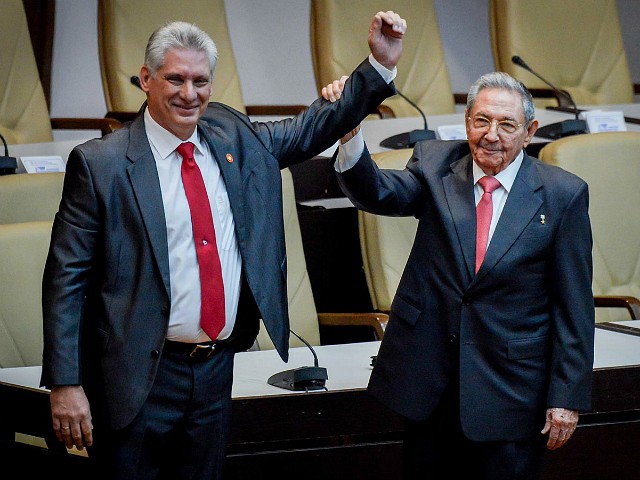
Former Cuban President Raúl Castro raises the arm of newly elected Cuban President Miguel Díaz-Canel during the National Assembly at Convention Palace on April 19, 2018 in Havana, Cuba. (AFP Adalberto Roque/Pool/Getty Images )
Castro was so impressed with Pope Francis that the avowed atheist joked to reporters, “I will resume praying and turn to the Church again if the Pope continues in this vein.”
Pope Francis’s visit resulted in widespread violence against known pro-democracy dissidents. The Patriotic Union of Cuba (UNPACU), believed to be the largest dissident organization on the island, documented that police detained as many as 300 people, including 142 UNPACU members, during Pope Francis’s time in Cuba to prevent them from potentially engaging in public acts of protest.
The detentions did not prevent at least one high-profile act of protest: Zaqueo Báez, a member of UNPACU, approached the pope’s vehicle during a public event and shouted, “Freedom!” Police then violently whisked him away directly in front of Pope Francis. The incident was caught on video.
The pope later denied, when reporters asked him on his flight from Cuba to the United States, that he had any information on politically motivated arrests – despite being caught on video witnessing a politically motivated arrest.
“I don’t have any news that any detentions happened. I have no news,” the pope said on the flight, according to Spain’s El País newspaper of record. He also did not answer if he wanted to meet with pro-democracy dissidents while on the trip.
The pope also refused to condemn human rights abuses in Cuba. Asked, “Should Havana improve its record on human rights, as well as religious freedom?” Pope Francis condemned unnamed governments in Europe instead of addressing Cuba.
“There are some countries and also some European countries where you cannot make a sign of religion, for different reasons, and on other continents the same,” Pope Francis said at the time. “Yes, religious liberty is not present in all the world. There are many places that do not have it.”
“The Pope did not utter a phrase of solidarity with the victims of repression and, when traveling from Cuba to the United States, told the press that he did not know about the detention of pacifist dissidents,” UNPACU later lamented in a press release.
The Univisión reporters asked Pope Francis in the interview airing Monday about widespread accusations that he is too sympathetic to communists – accusations not just from those concerned about human rights in Cuba, but also from religious figures like Hong Kong Cardinal Joseph Zen, who wrote in 2018 that Pope Francis has “natural sympathy for communists” and “doesn’t seem to understand” them.
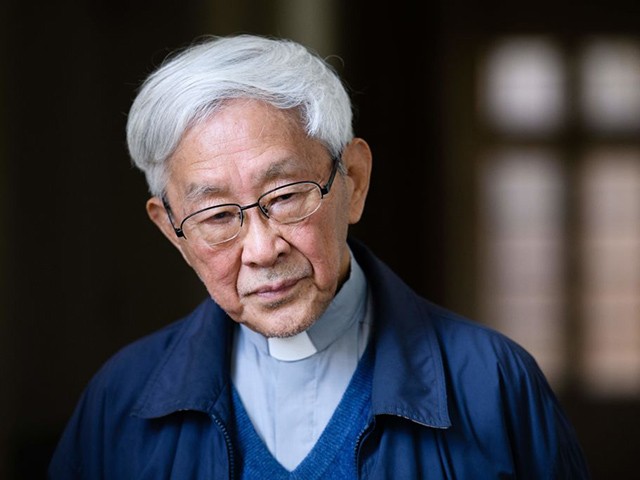
Cardinal Joseph Zen, 86, listens to a question during an interview with AFP in Hong Kong March 5, 2018. Hong Kong Cardinal Joseph Zen has earned a reputation as a fighter — the octogenarian’s latest battle pits him against Vatican officials and Beijing over a deal he believes would devastate the Catholic Church. (ANTHONY WALLACE/AFP via Getty Images)
“Certain ideologized groups of communications media who are dedicated to ideologizing the posture of others sometimes do not know how to distinguish communism from nazism, or populism from popularism,” the pope said, according to a transcription of his comments by the Colombian magazine Semana. “When they accuse me of communism I say, ‘that’s so outdated.’ Those accusations passed already, I see them as outdated.”
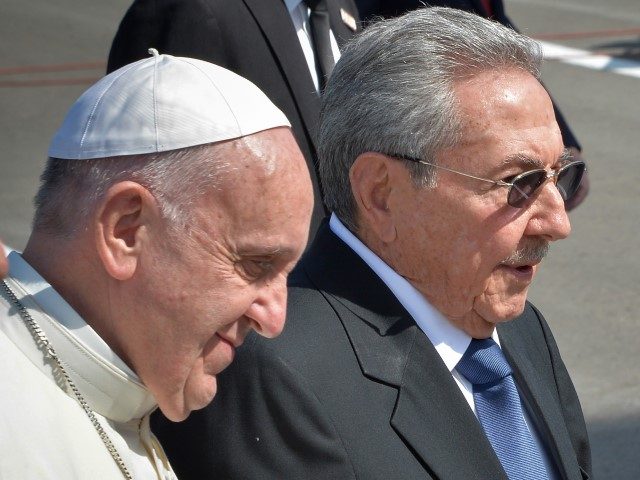
COMMENTS
Please let us know if you're having issues with commenting.